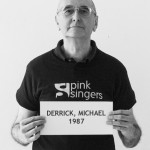The next MD to take up the pink baton was Michael Derrick, who had been accompanist under Robert Hugill. Michael (born 1946) was a Mathematics lecturer and active in the scene as a member of the Campaign for Homosexual Equality and a volunteer for the Gay & Lesbian Switchboard.
He did not seek out the choir; the choir found him:
One Saturday night in October 1986, I was drinking in my favourite pub. A complete stranger came up to me and introduced himself as Robert Hugill, the director of the Pink Singers. I had never heard of them. Robert was looking for an accompanist, and one of his drinking companions had pointed me out. He asked me to come to the rehearsal the next day – which I did.
Michael continued the structure that had been established by Robert Hugill and built on the work he had done.
[Robert had] turned them into a choir which gave regular concerts, rehearsed for concerts, had a standard repertoire, a rolling repertoire. He chose the repertoire, he wrote arrangement to suit the choir. And so every rehearsal was part of a build-up to a concert: a performance and then a new set of repertoire and so on. So I knew it was that sort of choir. And at every rehearsal there was the aim of putting on the next concert. So there was a very well defined set of objectives for each rehearsal. That was the choir that I joined and it’s more or less the structure that has survived to this day.
In 2013, Michael was asked about his contribution to the choir (he’s still a singing member today) and his response focused on the development of the membership:
Before I was the conductor it was a men-only choir. But when women came along to ask if they could join I always said yes, welcomed them, sat them down and gave them some music. And by the next week there was some specific things for them to do. I’d rewrite the arrangements to involve women. And then they brought friends and slowly the number of women increased. The first concert I conducted was the first concert the Pink Singers gave with women and men in the concert. Before that there were women and men together on the marches, but it was the first concert. And for every single concert since then there have been women and men in the choir. And that’s something I’m extremely proud of.
Michael Derrick went back to being the accompanist when Paul Cutts took over.
Timeline datestamp: 15 December 1988

